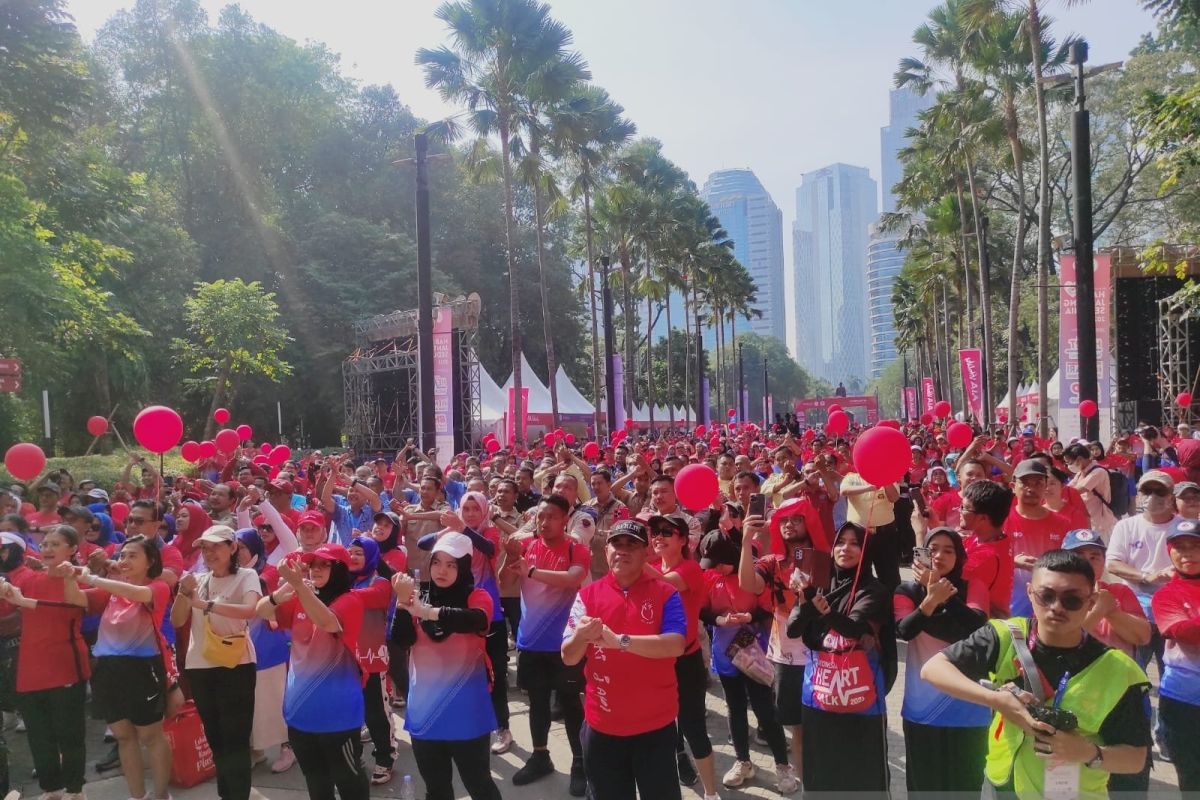Akin to other countries, Indonesia also commemorates WHD with the theme of "Know Your Healthy Heart, Love Your Life."
It is a known fact that cardiovascular disease currently still ranks as the top cause of death in Indonesia and the world. On the occasion of WHD celebration, various activities are held to provide an understanding and to increase public awareness of the importance of maintaining overall health, including of the heart.
Cardiovascular diseases can develop at any age, be it among adults and even babies.
Director of non-communicable disease prevention and control at the Health Ministry, Eva Susanti, stated that cardiovascular diseases cause the highest number of deaths in Indonesia.
"The leading causes of death in Indonesia are stroke, with 19.42 percent, and ischemic heart disease (heart attack), with 14.38 percent," Susanti remarked.
She highlighted that the two cardiovascular diseases are a cause for concern in Indonesia and the world, as ischemic heart disease causes 16.17 percent of deaths in the world, while strokes account for 11.59 percent of fatalities.
Susanti also pointed out that in 2022, financing for catastrophic diseases had risen to Rp24.06 trillion (around US$1.56 billion).
Moreover, Chairperson of the Indonesia Heart Foundation (Yayasan Jantung Indonesia/YJI) Esti Nurjadin believes that cardiovascular disease is a non-communicable disease that currently ranks first in mortality and morbidity in Indonesia.
The Health Ministry’s Basic Health Research (Riskesdas) in 2013 and 2018 shows an increasing trend in cardiovascular disease, namely 0.5 percent in 2013 to 1.5 percent in 2018.
She remarked that cardiovascular disease also ranks the highest in the government's health funding, namely Rp8.9 trillion in 2022 and Rp8.6 trillion in 2021, thereby remaining one of the biggest public health problems in Indonesia.
Nurjadin noted that currently, air pollution also had a major impact on health.
"In the short term, exposure to pollution can cause acute respiratory infections (ISPA), while in the long term, it can affect the performance of the body's organs, one of them, the heart," she cautioned.
She said that YJI, which has a vision and mission as a Healthy Lifestyle Pioneer, also conducts promotional and preventative activities to increase public awareness of the importance of preventing heart and blood vessel disease through Panca Usaha/Jantung S.E.H.A.T.
"We have a goal to help the government reduce the number of sufferers of heart and cardiovascular disease, so that we can reduce the burden of BPJS financing," she remarked.
S.E.H.A.T is the acronym for the Five Steps to a Healthy Heart that is applied in the form of promotive, preventive, and rehabilitative activities, namely: Balance nutrition (Seimbangkan gizi), stop smoking (Enyahkah rokok), face and overcome stress (Hadapi dan atasi stres), monitor blood pressure (Awasi tekanan darah), and exercise regularly (Teratur berolahraga).
Related news: Health Ministry expands heart screening services to posyandu level

"Event this year was different because this is the first time that YJI has collaborated with PERKI," she remarked.
She expressed hope that these activities would increase public awareness of the importance of preventing heart and cardiovascular disease because coronary heart disease can be prevented by adopting a healthy lifestyle.
Meanwhile, Consultant of Pediatric Cardiology & Congenital Heart Disease and member of PERKI, Dr. Aditya Agita Sembiring, Sp.JP(K) drew attention to a paradigm shift, wherein medical technology had become increasingly sophisticated.
According to Sembiring, with an increase in the number of cardiologists in Indonesia, the public had become smarter, and the technology had become more sophisticated.
“The effect was that the detection of cardiovascular disease sufferers was increasing, start from rare diseases that were not yet known, but now, it begins to be revealed. Hence, the paradigm has changed,” he noted.
According to Sembiring, currently, cardiovascular death was the leading cause of mortality in Indonesia and the world, and five factors that increase the risk of developing coronary heart disease are smoking, which increased the risk by two to three folds; high blood pressure; diabetes; cholesterol; and family history.
He also drew attention to the cardiovascular effects of air pollution, although it affects the lungs more.
“There is a connection,” he stated.
He also shared tips for a healthy heart that included conducting medical cardiovascular checkup once a year and engaging in moderate-intensity exercises, thrice to five times a week for 15-30 minutes.
Through the commemoration of WHD, he expressed optimism that Indonesian people, especially heart sufferers, would become more aware that heart disease can be prevented and treated.
“Hence, do not be afraid to find out early about heart disease, and if you are undergoing treatment, follow the advice from your doctors,” he stated.
Related news: Ministry to prepare five provincial hospitals for heart disease
Meanwhile, Professor of Arrhythmia at the Faculty of Medicine in University of Indonesia, Prof. Dr. dr. Yoga Yuniadi, Sp.JP(K) also shared an easy way for people to check their heart health through the "MENARI" activity.
"The method, namely, place three fingers (forefinger, middle finger, ring finger) on our arm and then touch it slowly until we feel our pulse, which is also our heartbeat. We count how many beats there are for 30 seconds," he explained.
After getting the beat results for 30 seconds, the results are multiplied by two in order to find the correct number of heart beats, or also known as the heart rate for each minute.
If the results range between 50 and 90 beats per minute (bpm), and no other complaints are experienced, then it means that the person's heart is healthy.
However, if the results are less than the ideal measurement results, namely 50-90 bpm, then it means there may be a problem with the heart's working system.
Regarding air pollution, he stated that in general, it has an effect on health, including the heart.
"There are contaminants in the air, including toxic substances that cause inflammation in blood vessels and then cumulatively can cause heart disease," he remarked.
He persuaded the people to do "MENARI" regularly to keep track of their heartbeats.
"The most important thing was to know if you are suffering from atrial fibrillation because it can cause strokes and paralysis," he emphasized.
Heart Walk activity, held at Gelora Bung Karno (GBK) Jakarta on September 28, drew a high level of public enthusiasm. People from various age groups, right from youngsters to the elderly, attended that event.
Apart from taking a leisurely walk together and breaking Muri's record through the "MENARI" activity, the public can also get a free health checkup. The stage action through the band's performance also enlivened the event.
Sawardi, 72, who is a member of the healthy heart club and YJI, also attended the WHD celebration at GBK.
“So far, I lead a healthy lifestyle and also often attend events like this. Hopefully, the people will become aware of heart health, so they can avoid heart and blood vessel disease," Sawardi stated.
Related news: Cardiovascular diseases responsible for most deaths: Health Ministry
Reporter: Asri Mayang Sari
Editor: Yuni Arisandy Sinaga
Copyright © ANTARA 2023












